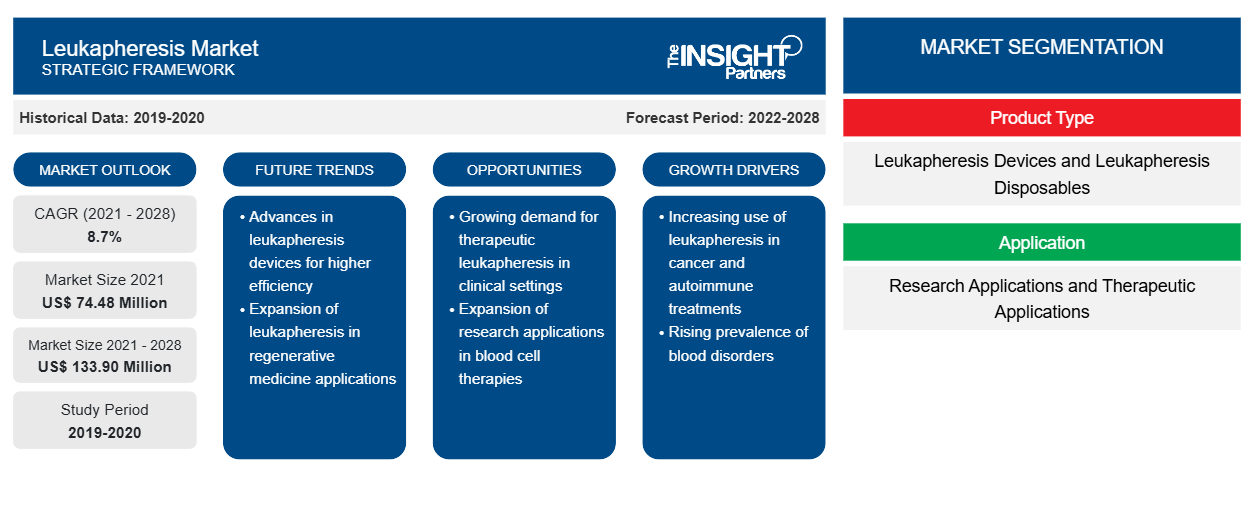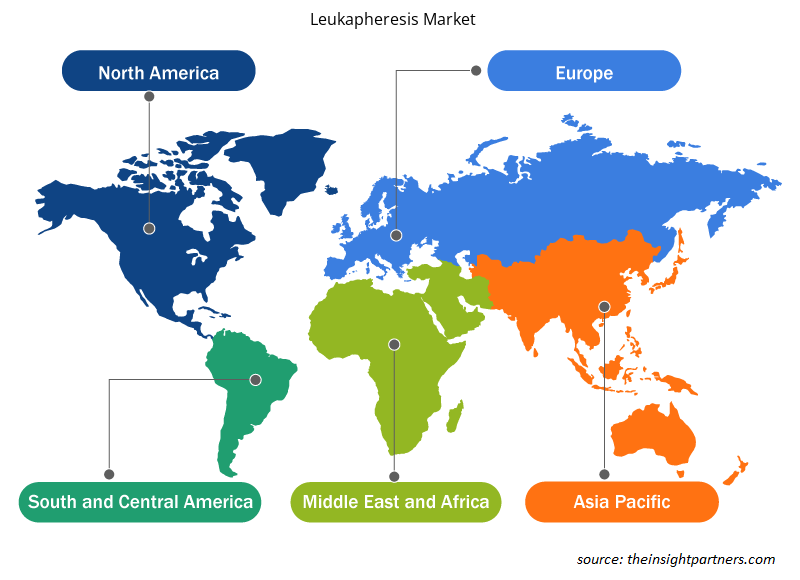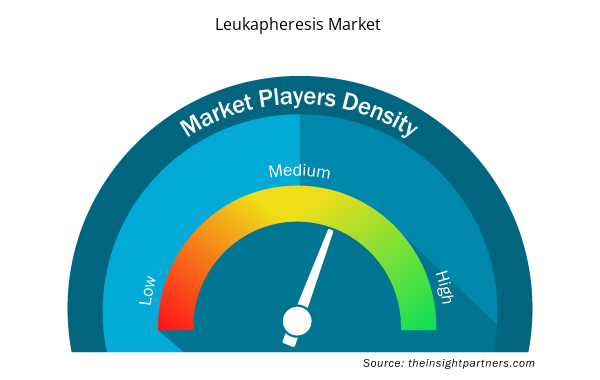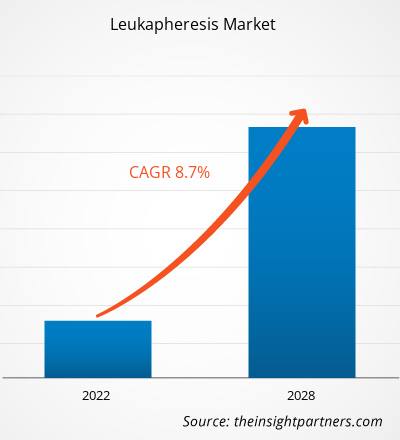[Research Report] The leukapheresis market is projected to reach US$ 133.90 million by 2028 from US$ 74.48 million in 2021; it is estimated to grow at a CAGR of 8.7% from 2021 to 2028.
Leukapheresis is a procedure that has white blood cells (leukocytes) involved in the body's immune response are segregated from a blood sample. It is a particular form of apheresis in which an element of blood, such as red blood cells or platelets, is obtained while the remaining blood is restored to circulation. Leukapheresis is often used to reduce very high white blood cell (WBC) counts, such as chronic blood cancers like chronic lymphocytic leukemia (CLL). It can also be completed to obtain white blood cells for later transplant, such as to manage abrupt declines in WBC counts throughout cancer chemotherapy. Another use is as a section of a novel form of immunotherapy, termed chimeric antigen receptor (CAR) T-cell therapy, to help fight leukemia, prostate cancer, and other forms of cancers. Leukapheresis can be completed on the person claiming treatment (autologous apheresis) or on a donor for a later transplant (allogeneic apheresis). Currently, leukapheresis is commonly used to treat various diseases, and it is also used for diagnostic purposes as it can increase circulating tumor cells yields. Factors such as the rising number of voluntary blood donors, increasing incidence of hematologic diseases, and surging elderly population are fueling the leukapheresis market growth. However, the high cost of leukapheresis obstructs the growth of the market to a certain extent.
Customize This Report To Suit Your Requirement
You will get customization on any report - free of charge - including parts of this report, or country-level analysis, Excel Data pack, as well as avail great offers and discounts for start-ups & universities
Leukapheresis Market: Strategic Insights

- Get Top Key Market Trends of this report.This FREE sample will include data analysis, ranging from market trends to estimates and forecasts.
You will get customization on any report - free of charge - including parts of this report, or country-level analysis, Excel Data pack, as well as avail great offers and discounts for start-ups & universities
Leukapheresis Market: Strategic Insights

- Get Top Key Market Trends of this report.This FREE sample will include data analysis, ranging from market trends to estimates and forecasts.
Market Insights
Blood transfusion is an integral part of the national health infrastructure and policies of various countries. Advancements in the medical industry have led to improvements in the treatment procedures of serious illnesses and injuries, which eventually has propelled the need for blood transfusion for patients’ survival. Growing awareness regarding the importance of blood transfusion and blood availability in healthcare services has led to rise in the number of people willing to donate their blood for medical causes. As per the World Health Organization (WHO) data, ~117.4 million blood donations were reported worldwide in 2018. Blood donors are usually classified to be voluntary unpaid, paid, and family/replacement, and as per the WHO claims, voluntary/unpaid donors are the major source of a reliable and adequate supply of blood. According to WHO data in 2019, blood donations by voluntary unpaid donors increased by 11.6 million from 2008 to 2015 in 139 countries in the world. The trend of blood donation is also gaining significant prominence in low and middle-income countries. According to the data presented during the CAG annual meeting 2017, ~13,000 procedures were performed on 1,087 patients in 2016. The greatest surge in the number of voluntary blood donors was found in Southeast Asian countries (83%) and the Americas (70%).
National programs developed and rolled out in many countries are further attracting a large number of platelet and blood donors. For example, in India, the National Blood Transfusion Council (NBTC), constituted within the National AIDS Control Organization (NACO), is the central body that coordinates with the State Blood Transfusion Councils (SBTCs), established within State AIDS Control Societies (SACS). The NBTC supports health programs for various activities related to blood transfusion services (BTS). Thus, the rising number of eligible donors in different countries across the world is fostering the need for leukapheresis equipment that is used to separate the required blood components.
Product Type-Based Insights
Based on product type, the leukapheresis market is bifurcated into leukapheresis devices and leukapheresis disposables. In 2021, the leukapheresis disposables segment held a larger market share. However, the leukapheresis devices segment is expected to register a higher CAGR during 2021 to 2028.
Application-Based Insights
The leukapheresis market, by application, is bifurcated into research applications and therapeutic applications. In 2021, the research applications segment held a larger share of the market and the same segment is expected to register a higher CAGR during the coming years.
End-User-Based Insights
The leukapheresis market, by end user, is segmented into pharmaceutical and biotechnology companies, academic and research institutes, blood component providers and blood centers, and hospitals and transfusion centers. In 2021, the blood component providers and blood centers segment held the largest share of the market. On the other side, the hospitals and transfusion centers segment is expected to register the highest a CAGR during the coming years.
Companies operating in the leukapheresis market are adopting strategies such as product launches, mergers and acquisitions, collaborations, product innovations, and product portfolio expansions to expand their footprint worldwide, maintain brand name, and meet the growing demand from end users.
Leukapheresis Market Regional Insights
The regional trends and factors influencing the Leukapheresis Market throughout the forecast period have been thoroughly explained by the analysts at Insight Partners. This section also discusses Leukapheresis Market segments and geography across North America, Europe, Asia Pacific, Middle East and Africa, and South and Central America.

- Get the Regional Specific Data for Leukapheresis Market
Leukapheresis Market Report Scope
| Report Attribute | Details |
|---|---|
| Market size in 2021 | US$ 74.48 Million |
| Market Size by 2028 | US$ 133.90 Million |
| Global CAGR (2021 - 2028) | 8.7% |
| Historical Data | 2019-2020 |
| Forecast period | 2022-2028 |
| Segments Covered |
By Product Type
|
| Regions and Countries Covered | North America
|
| Market leaders and key company profiles |
Leukapheresis Market Players Density: Understanding Its Impact on Business Dynamics
The Leukapheresis Market is growing rapidly, driven by increasing end-user demand due to factors such as evolving consumer preferences, technological advancements, and greater awareness of the product's benefits. As demand rises, businesses are expanding their offerings, innovating to meet consumer needs, and capitalizing on emerging trends, which further fuels market growth.
Market players density refers to the distribution of firms or companies operating within a particular market or industry. It indicates how many competitors (market players) are present in a given market space relative to its size or total market value.
Major Companies operating in the Leukapheresis Market are:
- Asahi Kasei Corporation
- Fresenius SE & Co. KGaA
- Haemonetics Corporation
- Terumo Corporation
- STEMCELL Technologies Inc.
Disclaimer: The companies listed above are not ranked in any particular order.

- Get the Leukapheresis Market top key players overview
Leukapheresis Market – by Product Type
- Leukapheresis Devices
- Apheresis Devices
- Leukapheresis Columns and Cell Separators
- Leukoreduction Filters
- Leukapheresis Disposables
Leukapheresis Market – by Application
- Research Applications
- Therapeutic Applications
Leukapheresis Market – by End User
- Pharmaceutical and Biotechnology Companies
- Academic and Research Institutes
- Blood Component Providers and Blood Centres
- Hospitals and Transfusion Centers
Leukapheresis Market – by Geography
North America
- US
- Canada
- Mexico
Europe
- France
- Germany
- Italy
- UK
- Spain
- Rest of Europe
Asia Pacific (APAC)
- China
- India
- South Korea
- Japan
- Australia
- Rest of Asia Pacific
Middle East & Africa (MEA)
- South Africa
- Saudi Arabia
- UAE
- Rest of Middle East & Africa
South America (SAM)
- Brazil
- Argentina
- Rest of South and Central America
Company Profiles
- Asahi Kasei Corporation
- Fresenius SE & Co. KGaA
- Haemonetics Corporation
- Terumo Corporation
- STEMCELL Technologies Inc.
- HemaCare
- Macopharma
- AllCells
- STEMEXPRESS
- BioIVT
- Historical Analysis (2 Years), Base Year, Forecast (7 Years) with CAGR
- PEST and SWOT Analysis
- Market Size Value / Volume - Global, Regional, Country
- Industry and Competitive Landscape
- Excel Dataset


- Equipment Rental Software Market
- Medical Devices Market
- Personality Assessment Solution Market
- 3D Mapping and Modelling Market
- Bioremediation Technology and Services Market
- Emergency Department Information System (EDIS) Market
- Extracellular Matrix Market
- Hydrogen Storage Alloys Market
- Smart Water Metering Market
- EMC Testing Market

Report Coverage
Revenue forecast, Company Analysis, Industry landscape, Growth factors, and Trends

Segment Covered
Product Type , Application , and End User

Regional Scope
North America, Europe, Asia Pacific, Middle East & Africa, South & Central America

Country Scope
Argentina, Australia, Brazil, Canada, China, France, Germany, India, Italy, Japan, Mexico, RoAPAC, RoE, RoMEA, RoSCAM, Saudi Arabia, South Africa, South Korea, Spain, United Arab Emirates, United Kingdom, United States
Frequently Asked Questions
Who are the key players in the leukapheresis market?
The leukapheresis market majorly consists of the players such Asahi Kasei Corporation, Fresenius SE & Co. KGaA, Haemonetics Corporation Terumo Corporation, STEMCELL Technologies Inc., HemaCare, Macopharma, AllCells, STEMEXPRESS, and BioIVT amongst others.
What is the regional market scenario of leukapheresis?
Global leukapheresis market is segmented by region into North America, Europe, Asia Pacific, Middle East & Africa, and South & Central America. In North America, the U.S. is the largest market for leukapheresis. The growth of the region is attributed to increasing product launches coupled with increasing patient population.
The Asia Pacific region is expected to account for the fastest growth in the leukapheresis market. Increase in government investments and a number of private biotechnology companies in this region contribute to this dominant share. The rising geriatric population and increasing investment in research are said to be responsible for this growth.
Which product type led the leukapheresis market?
The leukapheresis disposables segment dominated the global leukapheresis market and held the largest revenue share of 61.43% in 2021.
Which end-user held the largest share in the leukapheresis market?
The blood component providers and blood centers segment dominated the global leukapheresis market and accounted for the largest revenue share of 35.03% in 2021.
What are the driving factors for the leukapheresis market across the globe?
Key factors that are driving the growth of this market are number of voluntary blood donors, increasing incidence of hematologic diseases, surge in elderly population and growing demand for leukopaks in clinical research activities boost the market growth over the years.
What are leukapheresis?
Leukapheresis is a procedure that has white blood cells (leukocytes) involved in the body's immune response are segregated from a blood sample. It is a particular form of apheresis in which an element of blood, such as red blood cells or platelets, is obtained while the remaining blood is restored to circulation. Leukapheresis is often used to reduce very high white blood cell (WBC) counts, such as chronic blood cancers like chronic lymphocytic leukemia (CLL). It can also be completed to obtain white blood cells for later transplant, such as to manage abrupt declines in WBC counts throughout cancer chemotherapy. Another use is as a section of a novel form of immunotherapy, termed chimeric antigen receptor (CAR) T-cell therapy, to help fight leukemia, prostate cancer, and other forms of cancers. Leukapheresis can be completed on the person claiming treatment (autologous apheresis) or on a donor for a later transplant (allogeneic apheresis). Currently, leukapheresis is commonly used to treat various diseases, and it is also used for diagnostic purposes as it can increase circulating tumor cells yields.
Trends and growth analysis reports related to Life Sciences : READ MORE..
The List of Companies - Leukapheresis Market
- Asahi Kasei Corporation
- Fresenius SE & Co. KGaA
- Haemonetics Corporation
- Terumo Corporation
- STEMCELL Technologies Inc.
- HemaCare
- Macopharma
- AllCells
- STEMEXPRESS
- BioIVT

 Get Free Sample For
Get Free Sample For